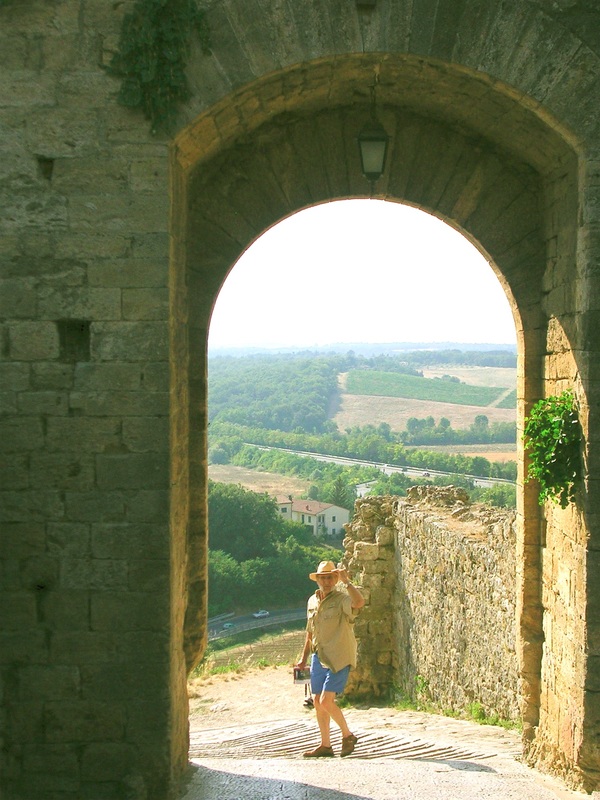| The Arch Long ago, there lived a people in the hills of what is now Italy. The Etruscans were not particularly peaceful, but they were skillful. They knew how to use stone to make buildings and walls. They engaged in art but they also engaged in warfare. And they knew how to create doorways in their walls, using an arch design. One day, a Roman army advanced upon an Etruscan village. They quickly overtook the village then built their own fortress to guard against any counter-invasion. The Romans lived quite well in their walled fortress. But after awhile, their food stores were depleted. They needed to go outside the walls to find new provisions. But to do so meant creating a hole in the walls of the fortress. The Roman engineers took out stones to create an opening in the wall. But this caused the upper stones to fall as well, so that an entire section of the fortress was breached. The Etruscan army soon saw this and began preparations to attack. The Romans quickly rebuilt the wall, with no opening. However, the people soon began to complain of hunger again. The food stores were completely depleted. So the engineers tried once more, but again the wall tumbled. Now they were caught between the wall and the hard hunger of their people. What to do? They tried once more, using a different technique, but again they failed. A young lad, an Etruscan who had been taken prisoner in the war, had watched the engineers every day. One day, the chief engineer spoke to him. “Why do you watch us?” he asked. “Why are you not working where you belong?” “I have finished my work,” the lad answered. “I watch you to learn. For I too, want to be an engineer some day.” “That will never happen,” the engineer said. “For you are a slave, a prisoner of war. Besides, what do Etruscans know of such advanced building? Yours is an inferior race.” The lad looked at him. “There may be skills you have that we do not,” he answered. “And that is why I watch and learn from you. But you would do well to learn from us as well. For there are things we know that you do not.” The engineer did not believe him and challenged the lad to show just one piece of knowledge the Etruscans possessed that the Romans did not. “The arch,” the lad answered promptly. “You keep making openings and the walls crumble. If you made an arch, that would not happen. But you do not choose to do so because you are vain.” Now the engineer was a learned man and thoughtful. He was not as vain as his superiors. So he said to the lad, “Can you show me how to make an arch?” “I am but a young apprentice, but I can try,” the lad answered. And in the dirt, he drew a diagram of an arch and told the man how to build a wooden frame then fill it with stones, including the all important keystone at the top. The engineer did as he was instructed and indeed, he built a small wall with an arch in the middle. It held fast. He called to his superiors to see. They shook their heads. “That will not work,” they said. “What do the Etruscans know, anyway?” But the engineer looked at the starving faces of his fellow villagers and decided to build an arch on the sly. That night, when the officers were partying and sleeping, he swore his workers to secrecy, went to a hidden part of the village wall and carefully constructed an opening, using wooden frames. Then he and his men began building, following the lad’s instructions. By morning, they had an arch in the wall. The engineer proudly showed the arch to his superiors. But instead of being impressed, they were angry. “Now there is an opening to be sure,” they said. “But the enemy can come in as well as we can go out.” The engineer’s heart fell. He hadn’t thought of this. But the Etruscan lad smiled. ‘Indeed” he said. “That is the idea. Let them in, show them they are welcome. They can bring you much needed food and you can provide them with protection. There is much our people can learn from each other. Just let me fetch my father, for he is the leader of my village. I will tell him you will receive him in peace.” The army was opposed to this. But the villagers were hungry and tired of war. They wanted to do as the lad said. “You have a choice,” he said. “You may choose war and continue as you have in hunger and want, or you may choose to open your doors to the others and live in peace and prosperity.” “We choose peace,” the people shouted. And the army had no choice but to listen. So that very day, the Etruscan lad went with his engineer friend to visit his father. There was much rejoicing among his family to see him safe and well. He talked to them about the Romans, told how they lived well and most were peaceful villagers much as themselves. If his people came in peace, he was sure they would be received in kind. So the Etruscans gathered grains, game, and other food and formed a procession to the walled fortress. They hesitated at the arch but the lad and the engineer lead them through the portal into the plaza in the center of the fortress. When the Romans saw the plentiful food before them, they greeted the Etruscans happily. They quickly prepared a feast and bade their neighbors to partake as well. For three days and nights, the two groups ate and drank and talked. The engineers of each side found they could learn from each other and the armies too, shared tactics. Over the years, the two villages became as one, until there were no longer Etruscans and Romans, but one people. The arch was widely built and the engineers soon learned how to put it to other uses. One such use was to make bridges, real bridges, just as the Etruscan lad had helped them to build a virtual bridge. May this be true of all people today, to open their walls and build portals and bridges so that they might learn from each other and live together in peace and prosperity. -MW | Possibilities Those who enjoy a healthy dose of self-confidence and self-esteem Tend to be tolerant, adaptable and decisive, Differences of opinion don't unhinge emotionally, Change is acceptable, indeed desirable, And life is exciting! Those short-changed in self-confidence and self-esteem Cling exclusively and desperately to their views, Change in circumstances is a torment and unpredictability an agony, Decisions torture and fray fragile nerves, And living is a chronic suffering! Neither lot is fixed, Either possibility is yours, Yours for the choosing, Yours for the living! Will and Choice Each human being is a unique bundle Of specific mental, emotional and physical Possibilities, all generous in their numbers. Each is fixed but not confined, Each is determined but not without choice. Choice and change can bud and flow Freely within prescribed range. All are free to stay or grow, All to be their own prisons, Or all their own possibilities. To choose to will and to will to choose Is to become as much of the self as possible. Confinement becomes expansive and freedom a fact! A Hard Fact of Life Life is what we make of it, Not what it makes of us. Life is there for us to shape, Not we for life's capricious way. To do, to shape, that is our lot, All else isn't worth a dot. Unfortunately fewer shape Than are shaped! A Paradox Choice in moderation Is a joyful privilege. Choice in wild excess Becomes an extreme burden. -JM An Epigram a Day: To do what is right is a challenge and to do what is wrong is a temptation. Every answer spawns a new question. Curiosity energizes, indifference lethargizes. Brains not used are brains abused. Choice is to have a voice. To wonder is to wander. Freedom and responsibility are morally coupled. -JM Píccola has her say: Humans are doorkeepers, so I can come and go at will. I want to go out- but you must come with me. I am a dog. I do not worry about may, should, could, must. I just do. |
|
0 Comments
Leave a Reply. |
Archives
February 2024
|

